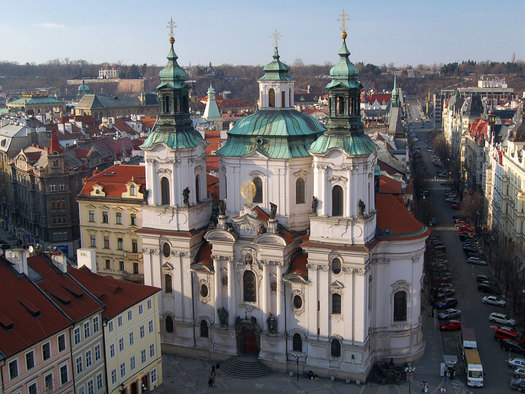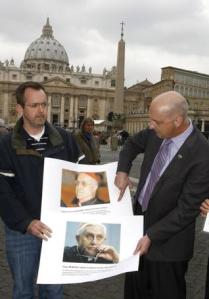"The crisis of confidence affecting the church has not occurred because the church is an association of abusers. The church is in crisis precisely because, confronted with undeniable evidence of abuse, it expresses concern for itself instead of offering to help the victims of the abuse, by offering compensation, for instance. This crisis results from the church's refusal to admit that the priesthood and religious orders are attractive to men with sexual identity issues."
The sudden, panicky flurry of Vatican pronouncements on the mounting problems with reports of clerical abuse are quite extraordinary. Note, please, that I say deliberately that the panic is about the reports of abuse, not about the abuse itself: for decades, the Vatican has known about the problems, but sought to keep it secret. Its own rules dictated secrecy, and that all cases should be referred to the Vatican. Any suggestion that they did not know, just doesn't wash. As a German reporter has noted,
These scandals progressed in America and we read about them, a reporter writes, but it turns out that exactly the same thing was going on all over Germany--but the German church was better able to keep it all under wraps.
Exactly. And in precisely the same way, it's a pretty safe bet that in still more countries where there have not yet been major stories emerging, this is not because the clergy have been better behaved, but because there has been better news management by the ecclesiastical structures. But exactly as the stories from the US and from Ireland have encouraged people to start speaking up in northern Europe, so the gathering tide will also encourage still others elsewhere to follow. Already, there have been references in some reports to recent disclosures in Poland, Italy and Spain as well as Germany, Austria, Netherlands and Switzerland, but I have been unable to track down any detail or verification. But today, I do not want to rehash the abuse itself: I have written extensively on that before. No, the really fascinating part now, is why after so much reticence in the past, are so many Church spokesmen suddenly falling over themselves with something to say - mostly in defence of the Church and of Benedict himself? Is it, perhaps, because they are suddenly aware of a real threat to their survival? In a lengthy opinion piece in today's Independent, Peter Popham reflects on the many contradictions in Benedict XVI: how the radical young theologian at Vatican II became the reactionary custodian at the CDF, muzzling the man who had appointed him to his post at Thubingen; how the "brilliant scholar and scheming politician" could make so many disastrous PR gaffes; and above all, how the man who swept triumphantly into office promising to clean up the church, could have presided while the church became mired in a crisis of credibility of current proportions. If it is possible to summarize five thoughtful pages into a few sentences, I would suggest that Popham's key thesis lies in the well known story of Benedict's horror at the excesses of the student radicals in the heady days of the late sixties, which he saw as an assault on the Church and the Christian faith. This led him to retreat from anything that smacked of "modernism", and to reformulate almost any tragedy as an attack on Christianity. For example, Popham shows how, even when he lamented the Holocaust while in Israel, he managed to reinterpret the story of the Nazis as an attack on the fundamentals of Christianity. In this retreat from "modernism", Benedict has simply repeated the pattern shown by his predecessors time and again. The First Vatican Council, which created the doctrine of papal infallibility, was a response to the democratic wave which swept Europe in the nineteenth century. In Italy, this meant a direct assault on papal territorial power.
For centuries, the Catholic Church tried to carry on as though the modern world did not really exist. Galileo's imprisonment and the denial of the truths elucidated by the likes of Darwin were all part of that compulsion. And when the unification of Italy liquidated the Church's secular power and drove it in upon itself in the few thousand square metres of the Vatican City, something of the sort happened intellectually too. The vast church with its thousands of bishops and millions of believers became a little room, crammed with musty certainties, and with the windows blacked out.
Vatican II attempted to open these windows and let in some fresh air, but Popes John Paul II and his acolyte Benedict XVI have shit them again. Is it any wonder that when the modern world forces itself onto their attention, demanding accountability and transparency about serious problems in the global governance of the church, the reaction should be primarily defensive, as though all criticism of behaviour or specific practices were an attack on the Church itself?
Meanwhile, the theologian John McNeill has written again about the hope we may legitimately find in the current Vatican meltdown. he does not attempt to go into the "causes" of the problem, but instead he describes the opportunity of the Kairos moment we are in: out of the chaos and disaster, the Holy Spirit has an opportunity to rebuild a new church, better able to serve the modern world. Here are some extracts:
At the last supper Jesus told his disciples. "If I do not die, the Spirit cannot come to you! But if I die I will send the Holy Spirit, who will dwell in your hearts and lead you into all truth." Jesus was revealing a basic truth about spiritual maturity. Our external authorities must fail us before we can find the presence of God's spirit within us and within our experiences.
This message of Jesus was repeated in the teaching of Vatican II on freedom of conscience: "Humans have in their hearts a law written by God. To obey it is the very dignity of the human; according to it we will be judged. Conscience is the most secret core and sanctuary of the human. There we are alone with God, whose voice echoes in our depths."
The Holy Spirit is trying to lead the Catholic church into a mature "freedom of conscience." In order to do so the Spirit had to grant us the gift of obviously fallible leaders. This is the context which gives meaning to the terrible failure of leadership from the hierarchy.
The refusal of leaders in the Church to accept married men and women into the priesthood has been a major factor in the worldwide pedophile crisis. Pope John Paul II paid special honor to Fr Marcial Degollado, a known pedophile and deposed Pedro Arrupe, the General of the Jesuits, a man with the reputation of being a saint, because he supported welcoming gay and lesbian Catholics to full membership in the Church, favored the ordination of married men and women and supported liberation theology.
The priesthood, limited to heterosexual chaste men is rapidly disappearing in the developed world and will soon do so in the rest of the world. Through all these actions the Holy Spirit is trying to transform the Church into a democratic institution where authority comes from the bottom up. Leaders of the Church are being asked to carefully discern what the Spirit is up to, to listen carefully to what the Spirit is saying through the "People of God".
It is time now to reconvene the Vatican council and complete the reformation of the Church which the Spirit began in Vatican II. Let us all pray that the Church will be open to this invitation of the Holy Spirit.
Amen, John, Amen.
Let us pray.




 When I
When I 








